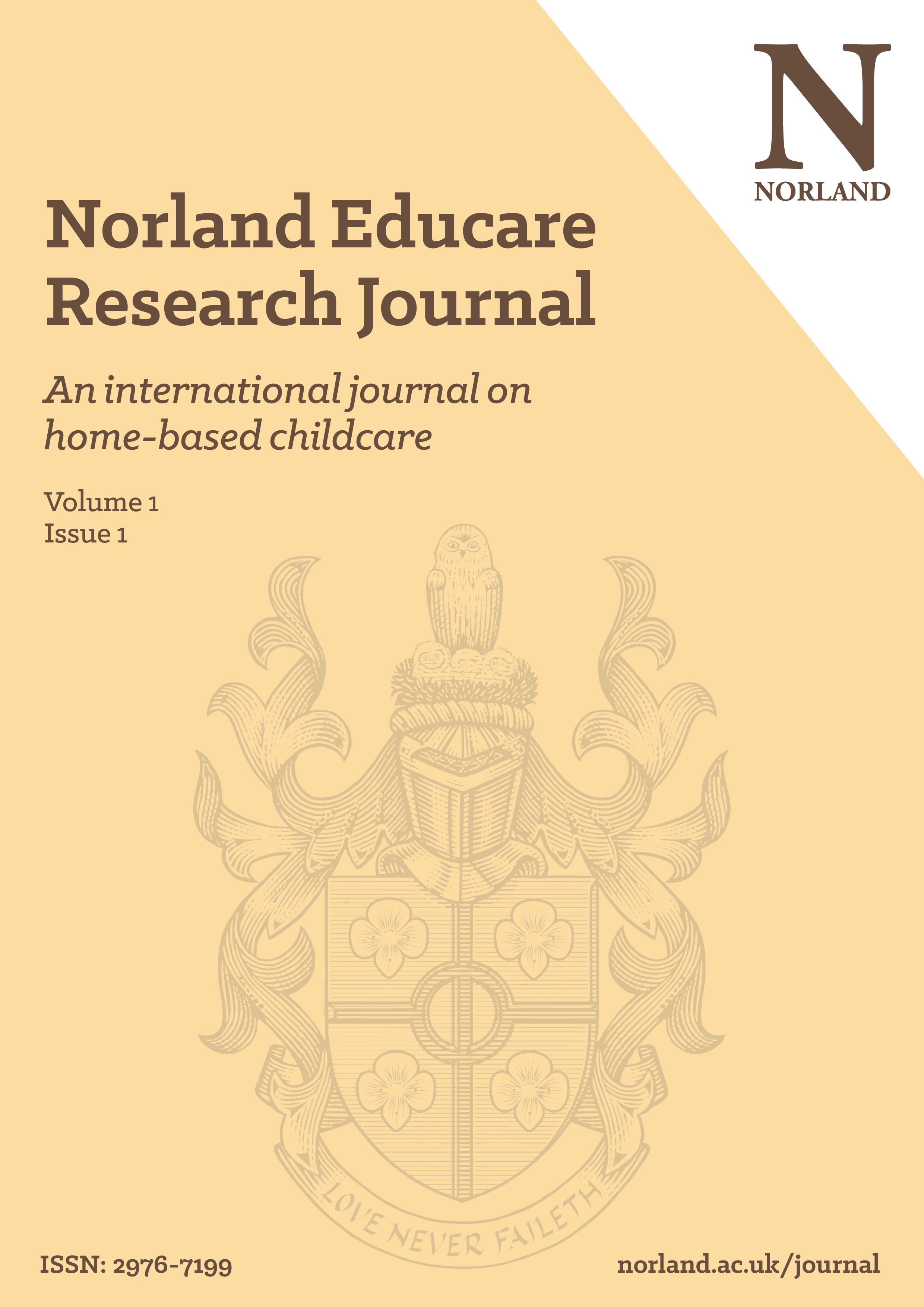Editorial – Home-based educarers: powerful agents who cannot be neglected!
Back to Norland Educare Research Journal
About the journal
Read more about the journalEditorial board
View our editorial boardJournal policies and ethics
View our policies and ethicsPeer review process
View peer review processInformation for readers
Read our information for readersInformation for authors
Read our information for authorsCall for papers
View our call for papersTerms and conditions
View terms and conditionsHome-based childcare, in the form of childminding and nannying, is a vital service to families (Ang et al., 2017). It is mainly used by families, such as those in rural areas, who cannot access centre-based childcare and who require childcare that is flexible and tailored to their needs (Hooper, 2019). Yet, despite the vital role of home-based childcare, there is little research available on this subject, especially concerning nannies (Purdon, 2021), in comparison to centre-based childcare, which is a more established area of research (Ang and Tabu, 2018). Home-based childcare is a neglected area of provision that remains out of sight of policymakers, and it is often undervalued and considered to be of lesser quality compared to centre-based childcare.
While research on home-based childcare remains a small and developing field, an increasing number of studies have been conducted, especially in the last decade, including literature reviews, evaluation studies and empirical research exploring parents’ and home-based educators’ views and practices. A common theme that emerges from such studies is that home-based childcare is a service to families that goes beyond childcare. It is underpinned by strong and long-term relationships between home-based child carers, the children under their care and the children’s families, and it offers a distinct pedagogical approach (Ang et al., 2017).
Home-based childcare, however, presents challenges for both policymakers and researchers. Because of its variability due to the fact that different families receive different services depending on their needs, home-based childcare remains largely unregulated. When it is regulated, like childminding in England, it is expected to be aligned with the standards established for centre-based childcare, a policy imperative that has led to high attrition from the profession (Shorto and Landes, no date). Furthermore, when home-based childcare is evaluated, this is usually done by employing rating scales developed for centre-based childcare, which produce variable and inconsistent findings, and fail to capture its distinctiveness and uniqueness.
Thus, it is imperative to conceptualise home-based childcare for what it is, and clearly articulate its implications for practice and policy purposes. The Norland Educare Research Journal was founded to bring together existing research on home-based educare and, at the same time, encourage further knowledge production. Grounded in the work of researchers and practitioners in the field, the journal is intended to challenge established early childhood discourses, practices and policies, and to construct situated knowledge on home-based educare which is of global relevance and local significance.
For this inaugural issue, Paulette Luff, one of the journal editors, had the pleasure of speaking to Dr Penelope Leach, an eminent academic researcher and strong advocate of home-based childcare, especially in the form of childminding. Dr Leach talks about her work as a research psychologist, and how she came to author her seminal books Babyhood and Your Baby and Child; in 2022, she updated the latter to reflect significant societal changes and enhanced understanding of child development. She shares her ideas about ideal childcare and talks about her efforts to achieve the professionalisation of childminders. She expresses her concerns about what she calls the ‘infant gap’ during Covid-19, when little attention was paid to under-twos. She concludes the conversation with a final message to home-based educarers: “Relationships are what matter most to infants and young children” – a statement that supports and is supported by research findings on home-based educare.
We also have three short invited papers from Professor Lynn Ang, Professor Hasina Ebrahim and Dr Alison Hooper, who were asked to share their expertise regarding home-based childcare in different parts of the world. Professor Ang provides a brief critical review of international research (e.g., Flemish, French, German and Australian contexts) as well as her own research in the UK and Japan, revealing that home-based childcare is a vital resource that provides a unique model, based on close and supportive relationships between child carers, children and their families. She also discusses the challenges and opportunities relating to the professionalisation of home-based educarers, echoing the messages of Dr Penelope Leach. She concludes by reflecting on the crucial role of childcare during the pandemic and the need to develop and validate quality measures that capture the strengths of home-based childcare to inform regulatory frameworks.
Professor Ebrahim takes us to the context of South Africa and other sub-Saharan countries, reviewing home visiting programmes as a preventative strategy and protective factor, especially for young children growing up in vulnerable circumstances. She discusses the problematic adaptation of imported models and highlights the challenges not-for-profit organisations face in delivering such models with a workforce who are not suitably trained (or paid). The lack of evidence trails for the effectiveness of such services is an additional challenge for their scalability and sustainability. Professor Ebrahim sets out a way forward, outlining key government actions required for home visiting to flourish, including ring-fenced funding, coordination of the programmes currently delivered by different providers and the introduction of a monitoring and evaluation system. She concludes that the home visiting modality needs to be part of a well-structured system with a well-qualified and well-paid workforce.
Dr Hooper reports on her empirical research with licensed family child carers in the US, exploring how they describe their family-focused roles and the support that they offer to families. Echoing similar arguments as other researchers, Dr Hooper reports that family child carers play a vital role in supporting families, which includes offering information and resources, building relationships with families, and acting as an extension of the family in ways that benefit both the child/children and their family. She notes that these essential components of quality are often under-recognised and undervalued in traditional quality measures. Dr Hooper also explains that child carers find it difficult to navigate their family-focused roles, particularly in challenging and emotionally complex situations, such as when families are experiencing hardship, and especially when such situations affect the child. She states that future work could consider ways to support the unique and valuable role of family child carers, while ensuring that this is not done at the expense of their own wellbeing.
This issue also includes four peer-reviewed papers from recent research on home-based childcare. Dr Miriam O’Regan reports from an Irish context, reviewing the country’s pivotal pieces of legislation and policy and presenting the findings of her own research with childminders. Dr O’Regan explores and seeks to describe the essence of childminding, and documents two distinct cultural models: a Close Relationship model, where each child feels loved and special, and a Real-Life Learning model, in which the primary goal is to utilise the learning opportunities that arise from everyday experiences in a home environment. She also reports on childminders’ journeys to professionalisation, from their experiences of parenthood and the finding of a niche area for income generation, to adult education, support and supervision. Crucially, the childminders stated that rather than there being pressure to conform to inappropriate centre-based standards, there should be public recognition of childminding as a unique provision. Following consultation, the government of the Republic of Ireland set out a three-phased action plan for the period from 2021 to 2028. The first phase focuses on developing regulations, training and costings; the second phase is about introducing the new regulations, having transitional training and offering access to a national childcare scheme and expansion of support; and the final stage is full implementation of the regulations, with childminders accessing multiple supports. The introduction of the national framework resonates with Professor Ebrahim’s call for government action in sub-Saharan countries, providing a concrete example of the type of initiative that can be implemented.
Through participatory action research with a group of childminders in a locality in the east of England, Dr Kay Aaronricks explores the question, ‘What is a childminder?’ She reports that childminders see their work as being different from group-based provision, but they also note that it differs vastly across childminders, depending on the type of home setting they work in. Echoing Dr O’Regan’s findings, the childminders speak positively about children having access to a home environment and how such a setting affords a distinct pedagogical approach, and they consider partnership with parents to be crucial in promoting a shared sense of family values. Dr Aaronricks recommends that future research should focus on building a deeper understanding of childminders’ distinctive pedagogy, while exploring their engagement with innovative approaches towards rebuilding local networks and support groups.
Two of us (Papatheodorou and Luff) contribute a paper of our own. In our study, we explore the key characteristics and qualities of home-based educare through a survey that was distributed among trained nannies and childminders. The findings of the study corroborate previous research, which has indicated that home-based childcare is a crucial service to families that offers flexible and family-needs-based childcare, underpinned by strong relationships, a distinct real-life pedagogy and unique structural and contextual qualities of the home environment, as noted by Miriam O’Regan and Kay Aaronricks in this issue. The study offers further insights into the personal attributes of home-based educarers and their role as professional knowledge brokers. Home-based educarers act as a brokering force by providing parents with information and resources to help them navigate complex educational and support systems, and they often assist with challenging personal and family situations. As such, it is proposed that home-based childcare is reconceptualised as a support system for families that has both child and parental wellbeing at its heart.
Finally, Dr Harriet Pattison takes us in a different direction by reporting on her study about education professionals who choose to home-educate their children. Drawing on social capital theory, Dr Pattison explores whether education professionals who home-educate their children have, and are able to deploy, bridge-building capacity – that is, the ability to build relationships between dissimilar groups of people. The study demonstrates that education professionals who home-educate have the capacity to build, and are willing to act as, bridges between home and mainstream education. They are able to combine their familiarity with the professional world of education with the possibilities of home education and to see how the strengths of home education could enhance and add possibilities to the aspirations of schools. The research shows that school and home education can be treated as a continuum, with education professionals and home educators working together, to their strengths, to engender new possibilities and partnerships. These findings are similar to those in our study (Papatheodorou and Luff), where trained educarers, using their professional knowledge, become brokers in assisting parents to understand and navigate complex educational and social systems, and they also reflect calls for home-based educare to become part of a continuum of childcare rather than being subsumed by or defined in the image of centre-based childcare, as noted by Miriam O’Regan.
Evidently, there is increased awareness of home-based educare as a distinct and unique form of childcare, with some key characteristics and qualities emerging. Yet, existing research demonstrates the need for further investigations of home-based childcare, and especially the work of nannies, to elaborate on and explicate its intricacies, nuanced processes and differential impact on children and families, starting from what they need, rather than from a universal framework oriented towards centre-based childcare. The differential outcomes and impact on individual children and families may present challenges for policymakers and implementers, but overcoming these is not impossible. By moving away from dominant epistemological and methodological paradigms and employing creative alternative approaches, early childhood researchers can alter the discourse and course of action. This is what we, as the editors of this journal, are calling for.
Finally, in closing our editorial piece, we would like to note that the inaugural issue of the journal is a tribute to the legacy of the educational pioneer Emily Ward, the founder of Norland, who viewed education and care as indistinguishable ingredients of childcare – a perspective that the title of the journal honours. Emily Ward argued that young children should be cared for by trained tutors and that their care should be centred on the child and offered in a loving and nurturing environment. Love and resilience, reflected in her mottoes ‘Love Never Faileth’ and ‘Fortis in Arduis’ (‘Strength in Adversity’), underpinned her philosophy of human existence and experience. She saw educarers as “powerful agents in the state” (Ward, 1905), who “shall be recognised as a great united international force that cannot be neglected” (Ward, 1911).
After founding Norland in 1892, Emily Ward edited the Norland Quarterly, a publication she contributed to up until a year before her death in 1930. The Norland Educare Research Journal is an extension of Emily Ward’s original visionary publication, and we, as the editors, are interested in continuing her legacy by re-visioning home-based educare for the 21st century, an era defined by rapid changes at multiple levels of both the social and natural world. We are particularly interested in disseminating learning stories co-constructed by practitioners, policymakers, researchers and caregivers, substantiated by rigorous and credible research and argumentation, to establish and validate the unique role of home-based childcare.
We invite the reviewers and readers of the journal, as well as its contributors, to join us in our efforts.
References
Ang, L. and Tabu, M. (2018) ‘Conceptualising home-based child care: a study of home-based settings and practices in Japan and England’, International Journal of Early Childhood, 50(2), pp. 143–158.
Ang, L., Brooker, E. and Stephen, C. (2017) ‘A review of the research on childminding: understanding children’s experiences in home-based childcare settings’, Early Childhood Education Journal, 45(2), pp. 261–270.
Fauth, R., Owen, S. and Jelicic, H. (2013) The next best thing to being at home: parents’ views of quality in home-based childcare settings. London: National Children’s Bureau, Research Centre.
Hooper, A. (2019) ‘Classifying home-based child care providers: validating a typology of providers’ beliefs and self-reported practices’, Early Childhood Education Journal, 47, pp. 275–285.
Purdon, A. (2021) ‘Fostering quality interactions with children in the family home: what are the challenges for nannies?’, Education 3-13, 49(2), pp. 161–175. Available at: https://doi.org/10.1080/03004279.2019.1705371
Shorto, S. and Landes, A. (no date) Experiences of former childminders in London: report for the Greater London Authority. Report by the Family and Childcare Trust. Available at: https://www.familyandchildcaretrust.org/sites/default/files/Experiences%20of%20former%20childminders%20in%20London%20_%20Family%20and%20Childcare%20Trust_Final_0.pdf (Accessed: 16 February 2023).
Ward, E. (1905) Editorial letter. Norland quarterly, No. 27. Norland Nursery Training College.
Ward, E. (1911) Editorial letter. Norland quarterly, No. 43. Norland Nursery Training College.
Related articles
Front matter and content page: Norland Educare Research Journal
The Norland Educare Research Journal is an international double-blind peer-reviewed journal, published annually, online only. It is an open access journal, offering free-of-charge publication to researchers and authors, and free...
“Relationships are what matter most to infants and young children” – an interview with Dr Penelope Leach
Penelope Leach, PhD, CBE, child psychologist, is a very well-known name, especially for the generation of parents who raised their children in the 1980s and 1990s with reference to her...
Useful links and information for the Norland Educare Research Journal
About the journal
Read more about the journalEditorial board
View our editorial boardJournal policies and ethics
View journal policies and ethicsInformation for readers
View information for readersInformation for authors
View information for authorsCall for papers
View call for papersTerms and conditions
View terms and conditions



Translate this page